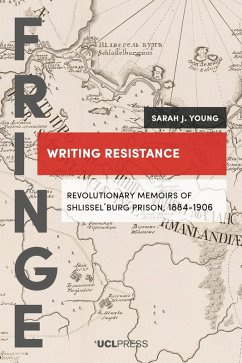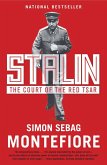In 1884, the first of 68 prisoners convicted of terrorism and revolutionary activity were transferred to a new maximum security prison at Shlissel¿burg Fortress near St Petersburg. The regime of indeterminate sentences in isolation caused severe mental and physical deterioration among the prisoners, over half of whom died. But the survivors fought back to reform the prison and improve the inmates' living conditions. The memoirs many survivors wrote enshrined their story in revolutionary mythology, and acted as an indictment of the Tsarist autocracy's loss of moral authority.
Writing Resistance features three of these memoirs, all translated into English for the first time. They show the process of transforming the regime as a collaborative endeavour that resulted in flourishing allotments, workshops and intellectual culture - and in the inmates running many of the prison's everyday functions. Sarah J. Young's introductory essay analyses the Shlissel¿burg memoirs' construction of a collective narrative of resilience, resistance and renewal. It uses distant reading techniques to explore the communal values they inscribe, their adoption of a powerful group identity, and emphasis on overcoming the physical and psychological barriers of the prison.
The first extended study of Shlissel¿burg's revolutionary inmates in English, Writing Resistance uncovers an episode in the history of political imprisonment that bears comparison with the inmates of Robben Island in South Africa's apartheid regime and the Maze Prison in Belfast during the Troubles. It will be of interest to scholars and students of the Russian revolution, carceral history, penal practice and behaviours, and prison and life writing.
Praise for Writing Resistance
'The memoirs published by Young have not been republished in Russian since the 1920s, becoming a bibliographic rarity [and] the presentation of which to an English-speaking audience is an undoubted breakthrough in studying the history of the prisoners of the Shlisselburg Fortress.'
Cahiers du Monde Russe
'Convey[s] a sense of squandered human potential.'
The Times Literary Supplement (TLS)
'An impressive study ... Young's expertise in Russian literature and language is reflected in her skilful translations capturing the many nuances, registers and special meanings of words used by the inmates. Like all history books that offer important and original translations of sources with a handy glossary and meticulous bibliography, this publication would be a welcome reference in any library. However, Young has produced a book for anyone interested in narratives about resistance, resilience and renewal.'
European History Quarterly
'Young has made a great contribution to prison literature with her translations, and her work would be of interest to academicians, researchers and students who are interested in carceral life of political prisoners during the Soviet Union.'
International Journal of Russian Studies
'Sarah Young has performed an exceptional service to the field of nineteenth-century studies by assembling this superb edition of three representative memoirs written by revolutionaries held in the Shlissel'burg prison under the Russian Empire's last two tsars, Aleksandr III and Nikolai II....Writing Resistance is an exceptional collection that will interest anyone who works on radical movements, prison reform and carceral issues, or even women's history in the nineteenth century. The collection raises important issues about the degree of continuity between nineteenth-century Russian carceral practices and the operations of the Soviet political confinement system.'
Nineteenth-Century Contexts
'Sarah J. Young's excellent collection of revolutionary memoirs from Shlissel'burg Prison provides a welcome addition to a range of scholarly fields, from history to carceral studies, translation and literature.'
Revolutionary Russia
Writing Resistance features three of these memoirs, all translated into English for the first time. They show the process of transforming the regime as a collaborative endeavour that resulted in flourishing allotments, workshops and intellectual culture - and in the inmates running many of the prison's everyday functions. Sarah J. Young's introductory essay analyses the Shlissel¿burg memoirs' construction of a collective narrative of resilience, resistance and renewal. It uses distant reading techniques to explore the communal values they inscribe, their adoption of a powerful group identity, and emphasis on overcoming the physical and psychological barriers of the prison.
The first extended study of Shlissel¿burg's revolutionary inmates in English, Writing Resistance uncovers an episode in the history of political imprisonment that bears comparison with the inmates of Robben Island in South Africa's apartheid regime and the Maze Prison in Belfast during the Troubles. It will be of interest to scholars and students of the Russian revolution, carceral history, penal practice and behaviours, and prison and life writing.
Praise for Writing Resistance
'The memoirs published by Young have not been republished in Russian since the 1920s, becoming a bibliographic rarity [and] the presentation of which to an English-speaking audience is an undoubted breakthrough in studying the history of the prisoners of the Shlisselburg Fortress.'
Cahiers du Monde Russe
'Convey[s] a sense of squandered human potential.'
The Times Literary Supplement (TLS)
'An impressive study ... Young's expertise in Russian literature and language is reflected in her skilful translations capturing the many nuances, registers and special meanings of words used by the inmates. Like all history books that offer important and original translations of sources with a handy glossary and meticulous bibliography, this publication would be a welcome reference in any library. However, Young has produced a book for anyone interested in narratives about resistance, resilience and renewal.'
European History Quarterly
'Young has made a great contribution to prison literature with her translations, and her work would be of interest to academicians, researchers and students who are interested in carceral life of political prisoners during the Soviet Union.'
International Journal of Russian Studies
'Sarah Young has performed an exceptional service to the field of nineteenth-century studies by assembling this superb edition of three representative memoirs written by revolutionaries held in the Shlissel'burg prison under the Russian Empire's last two tsars, Aleksandr III and Nikolai II....Writing Resistance is an exceptional collection that will interest anyone who works on radical movements, prison reform and carceral issues, or even women's history in the nineteenth century. The collection raises important issues about the degree of continuity between nineteenth-century Russian carceral practices and the operations of the Soviet political confinement system.'
Nineteenth-Century Contexts
'Sarah J. Young's excellent collection of revolutionary memoirs from Shlissel'burg Prison provides a welcome addition to a range of scholarly fields, from history to carceral studies, translation and literature.'
Revolutionary Russia
Dieser Download kann aus rechtlichen Gründen nur mit Rechnungsadresse in A, D ausgeliefert werden.









